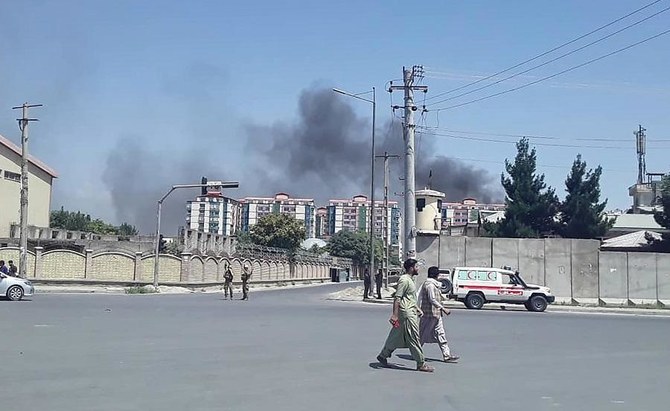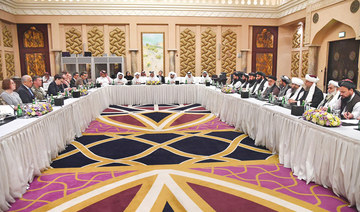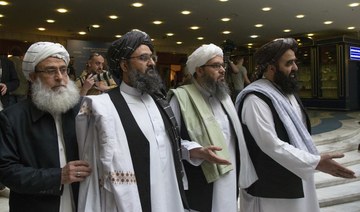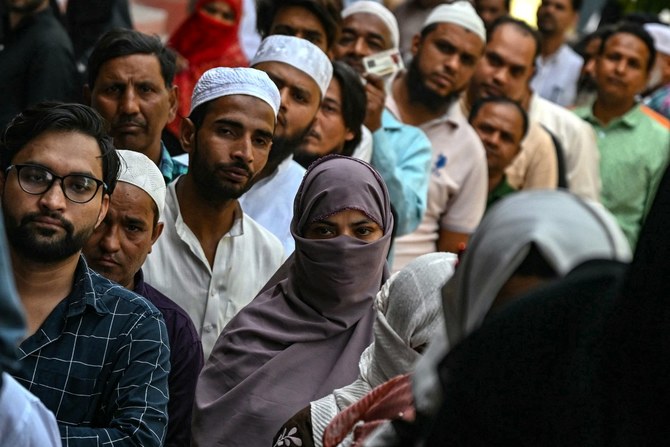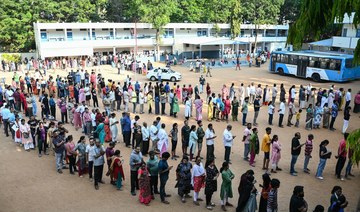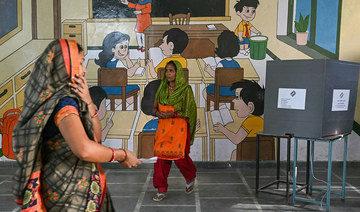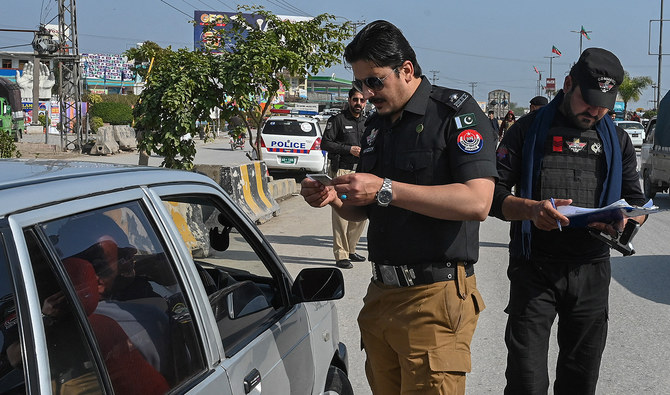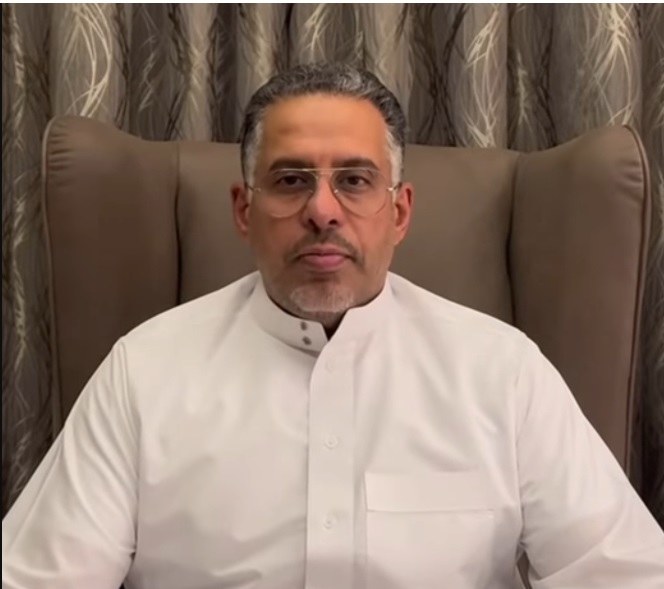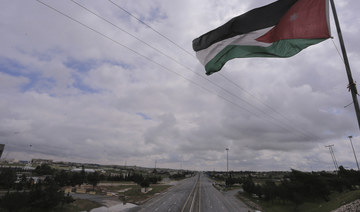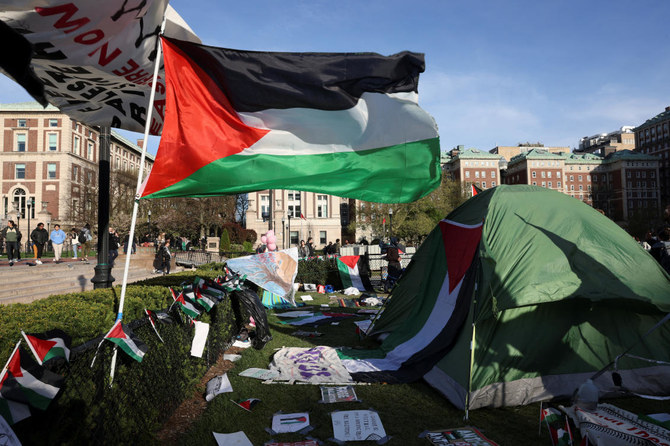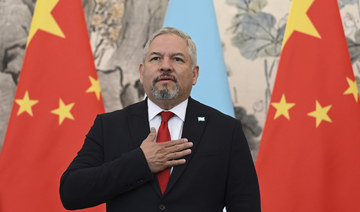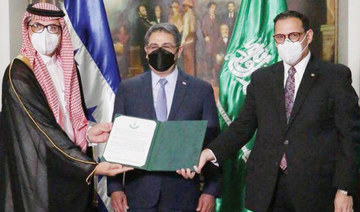NEW YORK: As students protesting the Israel-Hamas war at universities across US dug in Saturday and vowed to keep their demonstrations going, some universities shut down encampments after reports of antisemitic activity among the protesters.
With the death toll mounting in the war in Gaza, protesters nationwide are demanding that schools cut financial ties to Israel and divest from companies they say are enabling the conflict. Some Jewish students say the protests have veered into antisemitism and made them afraid to set foot on campus.
Early Saturday, police in riot gear cleared an encampment on the campus of Northeastern University in Boston while several dozen students shouted and booed at them from a distance, but the scene was otherwise not confrontational.
The school said in a statement that the demonstration, which began two days ago, had become “infiltrated by professional organizers” with no affiliation to the school and protesters had used antisemitic slurs.
“We cannot tolerate this kind of hate on our campus,” the statement posted on the social media platform X said.
The University of Pennsylvania took similar action Friday when interim President J. Larry Jameson called for an encampment of protesters on the west Philadelphia campus to be disbanded, saying it violates the university’s facilities policies.
The “harassing and intimidating comments and actions” by some protesters violate the school’s open expression guidelines as well as state and federal law, Jameson said, and vandalism of a statue with antisemitic graffiti was “especially reprehensible and will be investigated as a hate crime.”
“I am deeply saddened and troubled that our many efforts to respectfully engage in discourse, support open expression, and create a community that is free of hate and inclusive for everyone have been ignored by those who choose to disrupt and intimidate,” he said.
At Columbia University, where protesters have inspired pro-Palestinian demonstrations across the country, negotiations continued with those at the student encampment.
The university’s senate passed a resolution Friday that created a task force to examine the administration’s leadership, which last week called in police in an attempt to clear the protest, resulting in scuffles and more than 100 arrests.
Though the university has repeatedly set and then pushed back deadlines for the removal of the encampment, the school sent an email to students Friday night saying that bringing back police “at this time” would be counterproductive.
Decisions to call in law enforcement, leading to hundreds of arrests nationwide, have prompted school faculty members at universities in California, Georgia and Texas to initiate or pass votes of no confidence in their leadership. They are largely symbolic rebukes, without the power to remove their presidents.
But the tensions pile pressure on school officials, who are already scrambling to resolve the protests as May graduation ceremonies near.
California State Polytechnic University, Humboldt, gave protesters who have barricaded themselves inside a building since Monday until 5 p.m. Friday to leave and “not be immediately arrested.” The deadline came and went. Only some of the protesters left, others doubled down. After protesters rebuffed police earlier in the week, the campus was closed for the rest of the semester.
In Colorado, police swept through an encampment Friday at Denver’s Auraria Campus, which hosts three universities and colleges, arresting about 40 protesters on trespassing charges.
Students representing the Columbia encampment said Friday that they reached an impasse with administrators and intend to continue their protest. After meetings Thursday and Friday, student negotiators said the university had not met their primary demand for divestment.
In the letter sent to Columbia students Friday night, the university’s leadership said “we support the conversations that are ongoing with student leaders of the encampment.”
Columbia’s president, Minouche Shafik, faced significant criticism from faculty Friday, but retained the support of trustees.
A report by the university senate’s executive committee, which represents faculty, found Shafik and her administration took “many actions and decisions that have harmed Columbia University.” Those included calling in police and allowing students to be arrested without consulting faculty, misrepresenting and suspending student protest groups and hiring private investigators.
Also Friday, Columbia student protester Khymani James walked back comments made in an online video in January that recently received new attention. James said in the video that “Zionists don’t deserve to live” and people should be grateful James wasn’t killing them.
“What I said was wrong,” James said in a statement. “Every member of our community deserves to feel safe without qualification.”
James, who served as a spokesperson for the pro-Palestinian encampment as a member of Columbia University Apartheid Divest, was banned from campus Friday, according to a Columbia spokesperson.
Protest organizers said James’ comments didn’t reflect their values. They declined to describe James’ level of involvement with the demonstration.
In France, students at the Paris Institute of Political Studies, which counts President Emmanuel Macron among its many famous alumni, students blocked access to a campus building and classes went online as the wave of protests reached overseas.
Police clashed with protesters Thursday at Indiana University, Bloomington, where 34 were arrested; Ohio State University, where about 36 were arrested; and at the University of Connecticut, where one person was arrested.
The University of Southern California canceled its May 10 graduation ceremony Thursday, a day after more than 90 protesters were arrested on campus. The university said it will still host dozens of commencement events, including all the traditional individual school ceremonies.
Universities where faculty members have initiated or passed votes of no confidence in their presidents include Cal Poly Humboldt, University of Texas at Austin and Emory University.



